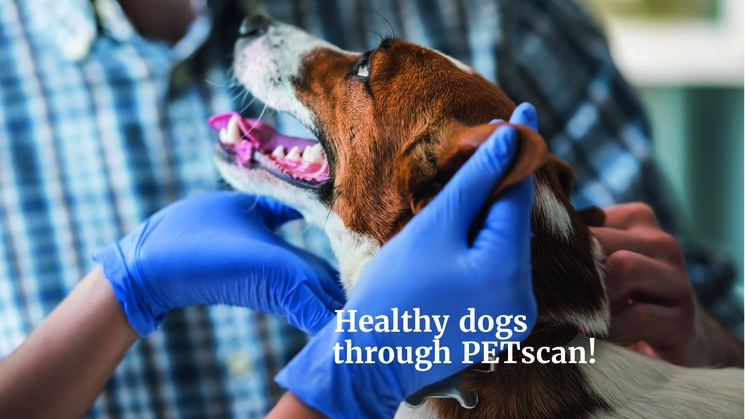Healthy Breeding
Dogs and cats are wonderful! They cheer us up when we’re down, are loyal friends and integral parts of the family. To see a beloved pet suffer from serious illness is heartbreaking, for their owners and treating veterinarians alike. Helping these animal becomes their top priority.
However, the most common serious diseases in dogs are genetic in nature, making long-term treatment options often difficult if not impossible. What’s more, even if an affected dog doesn’t show any symptoms, he or she can still pass the condition on to his or her offspring.
The researchers and veterinarians at the Companion Animal Genetics Expertise Centre are developing new methods to fight genetic diseases in dogs and other companion animals. Because healthy breeding is the foundation for a healthy life!
Wetenschappelijke fokbegeleiding voor Friese Stabij
17-07-2025 | 21:52Na de Vereniging Het Nederlandse Kooikerhondje (VHNK) gaat nu ook de Nederlandse Vereniging voor Stabij- en Wetterhounen (NVSW) samenwerken met het Expertisecentrum Genetica van de faculteit Diergeneeskunde, om het fokbegeleidingsplatform Fit2Breed te ontwikkelen voor de Friese Stabij. Net als het Kooikerhondje behoort de Friese Stabij tot het levend Nederlands erfgoed. Mede daarom steunt het Dinamofonds een duurzaam fokkerijbeleid bij deze rassen.
Fit2Breed is een fokbegeleidingsplatform dat fokkers kunnen gebruiken om een goede match te maken tussen ouderdieren, met als doel gezonde pups voort te brengen en te zorgen voor behoud van genetische diversiteit in de populatie.
De rasvereniging NVSW voor de Friese Stabij zet zich al jaren in voor een goede registratie van afstamming van de honden en gezondheidsproblemen die voorkomen in het ras. Met het gebruik van Fit2Breed komen hier nu ook waardevolle gegevens bij van DNA-testen en genetische markers. Al deze gegevens worden gecombineerd in het platform van Fit2Breed. Hiermee kunnen fokkers ook laten zien dat zij alle beschikbare informatie op een goede manier gebruiken om verantwoord te fokken
Het eerste Fit2Breed-platform werd ontwikkeld voor het Nederlandse Kooikerhondje. Kerstin Ueckert, voorzitter van Vereniging het Nederlandse Kooikerhondje: “Fit2Breed voor het Kooikerhondje is een groot succes. Alle Kooikerhondjes die wereldwijd gefokt worden zijn opgenomen in het programma. Meer dan 500 fokkers maken gebruik van Fit2Breed. Het is een heel nieuw programma en het was voor sommige fokkers wel even omschakelen om met Fit2Breed te gaan werken. Daarom organiseerden we voorlichtingsavonden en werksessies voor fokkers. Er is een goede samenwerking tussen de rasverenigingen van Nederlandse rassen. De ervaringen die opgedaan zijn met het Kooikerhondjes kunnen nu goed gebruikt worden voor de Friese Stabij.”
Riemie Lasker, secretaris van de NVSW: “Het delen van ervaringen vanuit het platform voor het Kooikerhondje was erg behulpzaam, omdat je dan ook uit de praktijk hoort wat het inhoudt om aan de slag te gaan met Fit2Breed. De NVSW is een enorm actieve vereniging met zeer veel leden. Ze zijn helemaal gek op hun honden, en stellen de gezondheid van het ras nu en in de toekomst voorop. Op onze algemene ledenvergadering werd dan ook met grote meerderheid voor Fit2Breed gestemd.”
Hille Fieten, coördinator van het Expertisecentrum Genetica Diergeneeskunde, is enorm blij met de positieve inzet vanuit de rasverenigingen. “Dankzij de samenwerking met de VHNK kon Fit2Breed een succes worden voor de Kooikerhondjes. Ook met de NVSW werkten we al eerder samen, onder andere bij onderzoek naar de neurologische aandoening Cerebrale Dysfunctie en de aangeboren hartaandoening PDAB (Persisterende Ductus Arteriosus Botalli). En nu gaan we gezamenlijk aan de slag om al deze kennis samen te brengen en de volgende generaties Nederlandse hondenrassen op een verantwoorde wijze te fokken. Dit is echt enorm goed nieuws.”
Dierenartsen zien steeds meer genetische aandoeningen bij rashonden die voorkomen hadden kunnen worden door gezonder te fokken. Het Expertisecentrum Genetica Diergeneeskunde wil daar wat aan doen door middel van wetenschappelijk onderzoek en praktische oplossingen, onder het motto: voorkomen is beter dan genezen.
Fit2Breed voor de Friese Stabij had niet ontwikkeld kunnen worden zonder bijdragen van de partners en donateurs van Vrienden Diergeneeskunde, waaronder het Dinamo Fonds. Ook zijn alle betrokkenen de Stichting Zeldzame Huisdierrassen dankbaar, die de NVSW in contact heeft gebracht met het Dinamo Fonds. Het Dinamo Fonds maakt zich sterk voor het behoud van onze leefomgeving met dieren, natuur en monumenten. Het Fonds draagt actief bij in het welzijn en het in stand houden van zeldzame huisdierrassen. Om deze bijzondere populaties dieren te behouden en hun welzijn te garanderen is ondersteuning in kosten hard nodig voor wetenschappelijk genetisch onderzoek, vernieuwende fokprogramma’s en voor de enthousiaste beheerders en houders met hun fok-en stamboekverenigingen in de komende jaren.
Luister het interview met Hille Fieten over Fit2Breed voor de Friese Stabij bij Omrop Fryslan hier (vanaf 44:15).




























